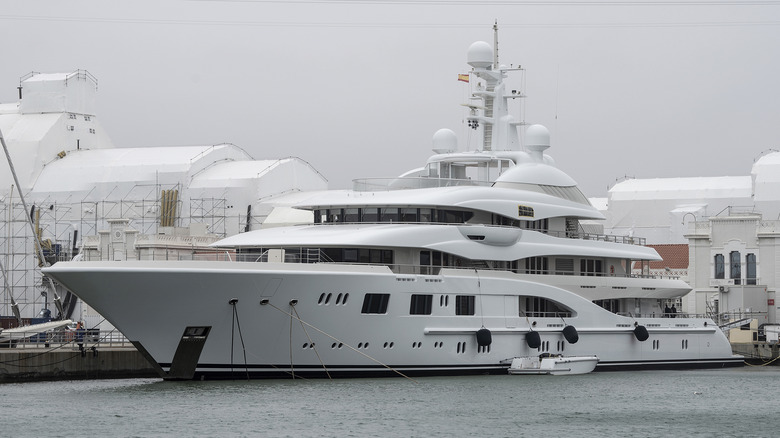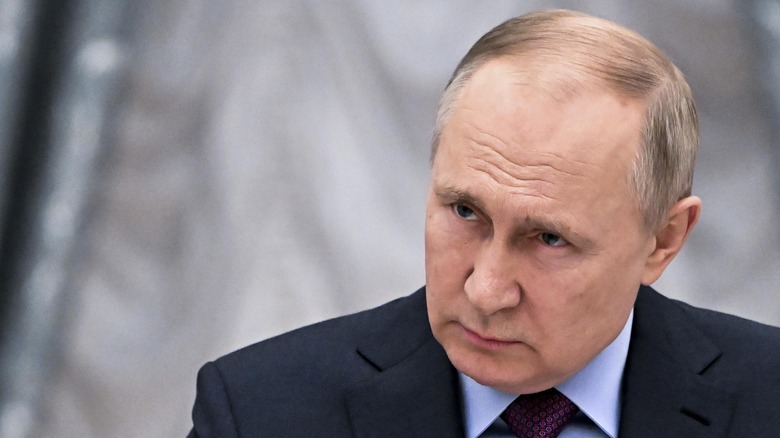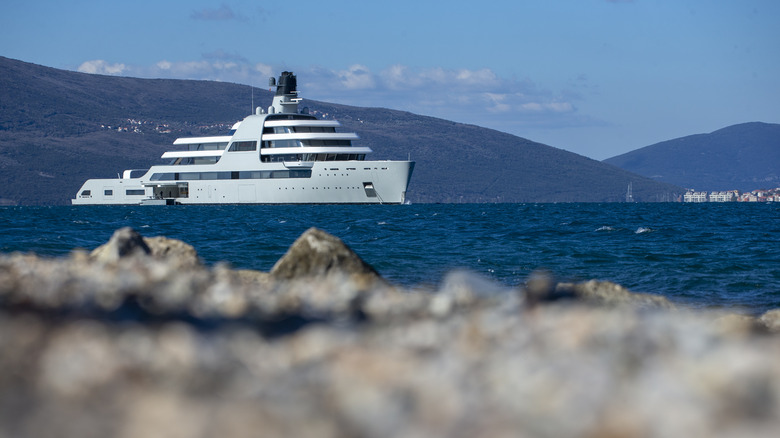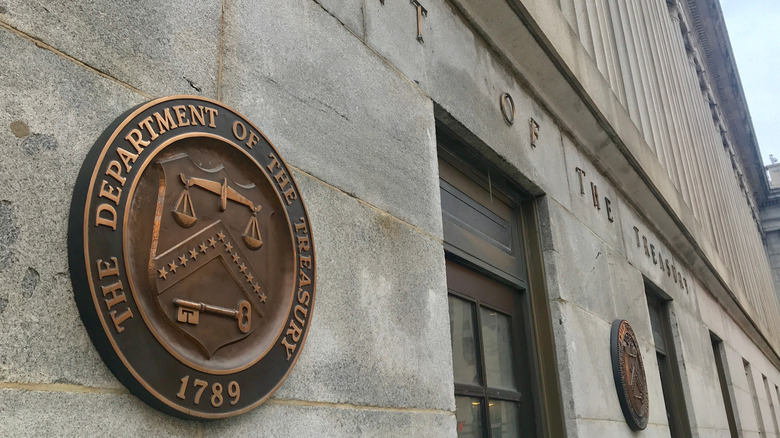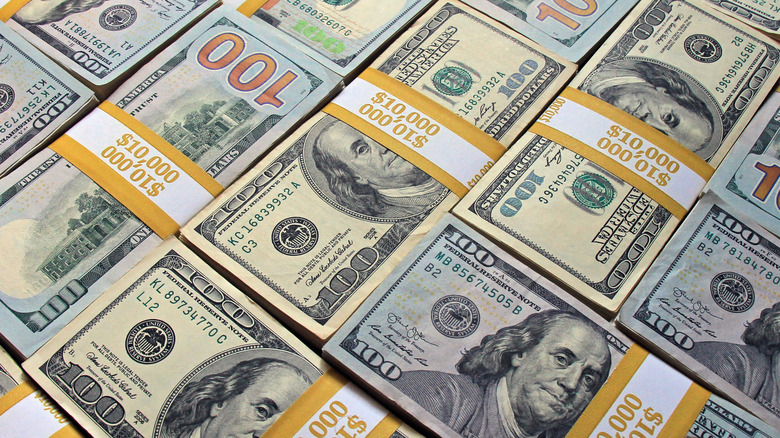The Surprising Reason Russian Oligarchs Might Want To Dock Their Yachts Outside The US
The Russian invasion of Ukraine and the ensuing deluge of condemnation and sanctions from the rest of the world have left some of Russia's richest and most powerful citizens scrambling to secure their most valuable assets. According to Vice News, governments around the world are looking for all the help they can in tracking down any forms of wealth that can be traced back to the Russian government. The United States has gotten in on the action and the government is turning to its citizens for information. There are rewards — up to $5 million worth — for information that leads to any seizures of yachts, private jets, and more.
Around the world, quite a few yachts owned by unimaginably rich Russians have been seized already, according to The Verge, while others took to the seas in hopes of evading capture for as long as possible. However, this may not work without proper crews to maintain the multi-million dollar yachts (via Insider).
What is an oligarch?
Put simply, an oligarch is a rich person who by virtue of their immense wealth wields a large amount of political power. Columbia University's Elise Giuliano, a lecturer who focuses on post-Soviet Russia in the school's political science department, told Forbes that oligarchs are "exceptionally wealthy businessmen who are politically and socially influential. They're often personally connected to a country's top political leaders, though not always." According to Britannica, modern examples of oligarchies include China and Russia, while some political scientists have even made arguments that the United States is one as well, given the country's level of income inequality.
Russia's oligarchs made their money in the 1990s after the Soviet Union's collapse and private bidders gained control of formerly state-run assets. During this time many businessmen and former Soviet officials wound up with large stakes in lucrative Russian industries like oil, gas, and transportation. Some of these oligarchs were instrumental in Putin's ascension to the presidency, at which point there was a second wave of oligarchs who benefited from Putin's administration.
How much power do Putin's oligarchs have?
While wielding power is part of the definition of an oligarch, it doesn't seem that it's necessarily the case for Putin's brood of them. They may have some power, but their wealth is also contingent on him. "Russia's oligarchs rely on Putin, whose personal permission is required to make large amounts of money in the country," Daniel Treisman, a political science professor at the University of California, Los Angeles, told Forbes.
One of the ways Russian oligarchs used to protect their wealth is by moving their money out of Russia and converting it to currencies that are more stable than the Russian ruble. With sanctions pummeling both the Russian government and its wealthiest citizens, this is no longer an option. "In this sense, the current isolation and decrease in oligarch wealth increases Putin's leverage over them," Treisman said. Some have speculated that this could lead to oligarch's panic-selling assets, which could lead to a new batch of wealthy Putin loyalists.
Steps oligarchs are taking to protect their assets
In March 2022, a 160-foot yacht worth $600 million called "Solaris" (above) left a Spanish shipyard, where it had been docked since the previous year, and started sailing with no discernible destination and without signs of stopping. According to Insider, Solaris belongs to Russian billionaire Roman Abramovich. He was one of the wealthy Russians hit by sanctions, specifically from the United Kingdom. These sanctions prevent the businessman, who is estimated to be worth over $13 billion from doing business there, which is perhaps a bit of a complication, considering Abramovich owns the Chelsea Football Team.
Nations have seized yachts and private planes from sanctioned Russians, with France claiming a $120 million yacht belonging to Igor Sechin, an oligarch with strong ties to Putin who has been given the nickname "Darth Vader" by Russian media (via Insider). It's believed that this is why Solaris has appeared to be aimlessly sailing, perhaps trying to mislead anyone watching as to where its real final destination will be. Georgios Hatzimanolis, a spokesperson for MarineTraffic, which is a company that —you guessed it — tracks marine traffic, said that the yacht had changed its status in a likely attempt at throw people off its trail, but that there is "Lots of speculation on if it will be Turkey, Israel, or even possibly the UAE."
The United States started a reward program for information on oligarch assets
The United States started issuing reward money for information leading to the seizure of more assets, but what's odd is that the building blocks for this program were approved a year before Putin chose to invade, resulting in an onslaught of financial sanctions. According to Vice News, the United States Congress approved the program, which was aimed at obtaining information to combat corruption in other countries around the world, not just Russia.
The program's official name is the Kleptocracy Asset Recovery Rewards Program, and it's managed by the Department of the Treasury's Office of Terrorism and Financial Intelligence. "Congress established the Kleptocracy Asset Recovery Rewards Program to further the U.S. government's commitment to combating foreign government corruption and serve United States efforts to identify and recover stolen assets, forfeit proceeds of corruption, and, where appropriate and feasible, return those stolen assets or proceeds to the country harmed by the acts of corruption ..." the Treasury Department website said.
How can you get your reward money?
On the off chance that you happen to be privy to information that will lead the United States government to seize a Russian oligarch's super-yacht, you're looking at a maximum $5 million reward, but as with everything, the program has its fair share of fine print and exclusions. Lots of things could qualify as "stolen assets," which the Kleptocracy Asset Recovery Rewards Program says "means financial assets within the jurisdiction of the United States constituting, derived from, or traceable to, any proceeds obtained directly or indirectly from foreign government corruption."
Ineligible for any of the reward money are government employees — United States Federal, state, local, or foreign — who obtain the information while doing their job. Another proviso is that anyone "involved in the underlying misconduct are subject to a mandatory reduction of any reward, and may be subject to a denial of an award, at the Secretary of the Treasury's discretion."
